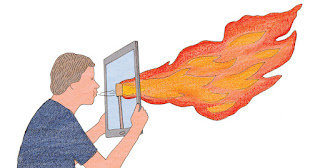Philadelphia Inquirer
Originally posted 25 JUL 22
Here is an excerpt:
Radical politics requires radical generosity toward those with whom we disagree — if we are to remain a free and civil society that does not descend into violence. Are we not a people defined by the willingness to spend our lives fighting against what another has said, but give our lives to defend her right to say it? Instead of being hypersensitive fragilistas, perhaps we could give that good old-fashioned American paradox a try again.
But how? Start by engaging in the democratic process by first defending people’s right to be awful. Then use that right to point out just how awful someone’s words or deeds are. Accept that you have freedom of speech, not freedom from offense. A free society best holds people accountable in the arena of ideas. When we trade debate for the dehumanizing act of cancellation, we head down a dangerous path — even if the person who would be canceled has behaved in a dehumanizing way toward others.
Canceling those with opinions most people deem morally wrong and socially unacceptable (racism, misogyny) leads to a permissiveness in simply labeling speech we do not like as those very things without any reason or recourse. Worse, cancel culture is creating a society where dissenting or unpopular opinions become a risk. Canceling isn’t about debate but dehumanizing.
Speech is free. The consequences are not. Actress Constance Wu attempted suicide after she was canceled in 2019 for publicly tweeting she didn’t love her job on a hit TV show. Her words harmed no one, but she was publicly excoriated for them. Private DMs from her fellow Asian actresses telling her she was a “blight” on the Asian American community made her believe she didn’t deserve to live. Wu didn’t lose her job for her words, but she nearly lost her life.
Cancel culture does more than make the sinner pay a penance. It offers none of the healing redemption necessary for a free and civil society. In America, we have always believed in second chances. It is the basis for the bipartisan work on issues like criminal justice reform. Our achievements here have been a bright spot.
We as a civil society want to give the formerly incarcerated a second chance. How about doing the same for each other?
